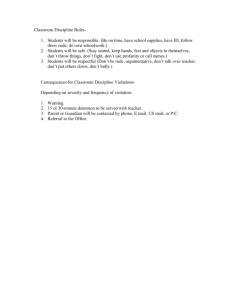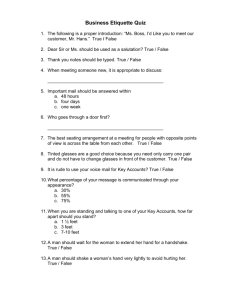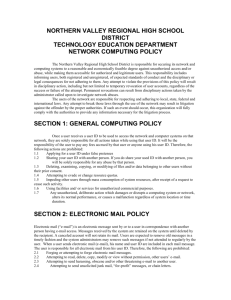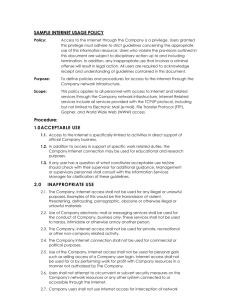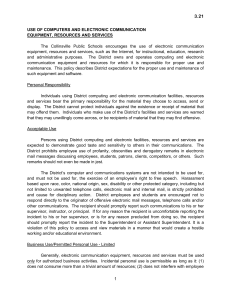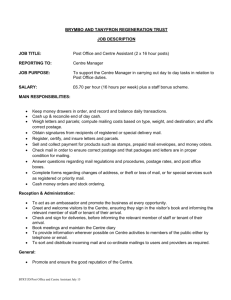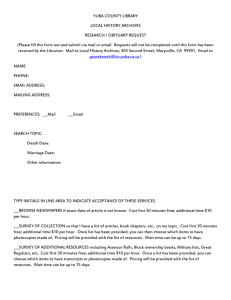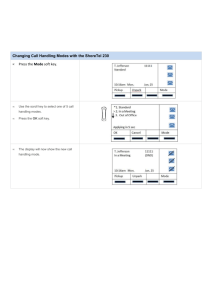Staff Network and Internet Acceptable Use and
advertisement
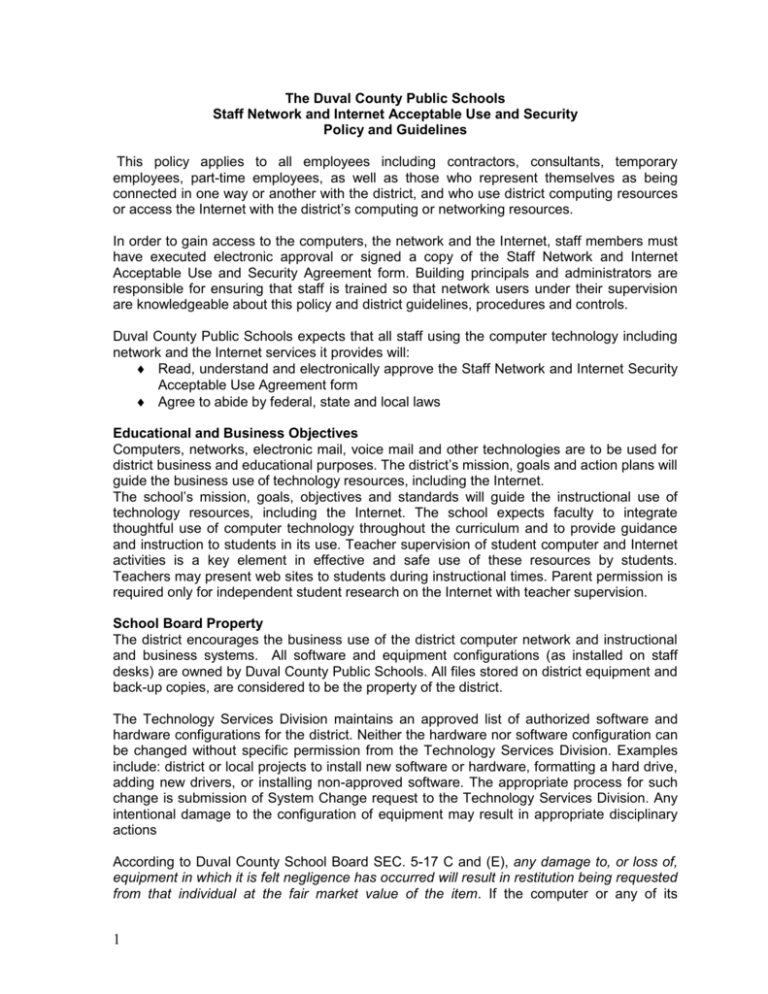
The Duval County Public Schools Staff Network and Internet Acceptable Use and Security Policy and Guidelines This policy applies to all employees including contractors, consultants, temporary employees, part-time employees, as well as those who represent themselves as being connected in one way or another with the district, and who use district computing resources or access the Internet with the district’s computing or networking resources. In order to gain access to the computers, the network and the Internet, staff members must have executed electronic approval or signed a copy of the Staff Network and Internet Acceptable Use and Security Agreement form. Building principals and administrators are responsible for ensuring that staff is trained so that network users under their supervision are knowledgeable about this policy and district guidelines, procedures and controls. Duval County Public Schools expects that all staff using the computer technology including network and the Internet services it provides will: Read, understand and electronically approve the Staff Network and Internet Security Acceptable Use Agreement form Agree to abide by federal, state and local laws Educational and Business Objectives Computers, networks, electronic mail, voice mail and other technologies are to be used for district business and educational purposes. The district’s mission, goals and action plans will guide the business use of technology resources, including the Internet. The school’s mission, goals, objectives and standards will guide the instructional use of technology resources, including the Internet. The school expects faculty to integrate thoughtful use of computer technology throughout the curriculum and to provide guidance and instruction to students in its use. Teacher supervision of student computer and Internet activities is a key element in effective and safe use of these resources by students. Teachers may present web sites to students during instructional times. Parent permission is required only for independent student research on the Internet with teacher supervision. School Board Property The district encourages the business use of the district computer network and instructional and business systems. All software and equipment configurations (as installed on staff desks) are owned by Duval County Public Schools. All files stored on district equipment and back-up copies, are considered to be the property of the district. The Technology Services Division maintains an approved list of authorized software and hardware configurations for the district. Neither the hardware nor software configuration can be changed without specific permission from the Technology Services Division. Examples include: district or local projects to install new software or hardware, formatting a hard drive, adding new drivers, or installing non-approved software. The appropriate process for such change is submission of System Change request to the Technology Services Division. Any intentional damage to the configuration of equipment may result in appropriate disciplinary actions According to Duval County School Board SEC. 5-17 C and (E), any damage to, or loss of, equipment in which it is felt negligence has occurred will result in restitution being requested from that individual at the fair market value of the item. If the computer or any of its 1 components are stolen, whether on School Board property or in your personal possession, the police must be notified immediately and a copy of the report must be submitted to the proper School Board personnel. All equipment, software and business files must be returned upon termination of employment. All equipment and software repairs should be reported to the district’s Technology Help Desk and repaired only by authorized district personnel. Electronic Communications There are various forms of electronic communications available on computer networks, including the Internet. All computers, networks, electronic mail and voice mail are to be used for district business and educational purposes. Duval County Public Schools must comply with federal regulations for student access to the Internet; therefore: individual student email accounts, instant messaging, chat rooms, and bulletin boards are not currently authorized uses for students of district technology equipment the district will not issue email accounts to students students will not be authorized to access personal email accounts using district equipment teachers are responsible for any email communication sent or received on behalf of their class using their personal email account teachers may not share their password with students students may not send or receive email messages using the teacher’s account students may create a document that the teacher can review and then email for them teachers are responsible for reviewing the content of any incoming email message before distributing it to the class Managing Electronic Messages It is the user’s responsibility to read mail regularly and maintain the mailbox. If an electronic mail message contains information relevant to the completion of a business transaction, contains potentially important reference information, or has value as evidence of a district management decision, it should be retained for future reference. Most electronic mail messages will not fall into these categories, and accordingly can be erased after receipt. Users must regularly move important information from electronic mail message files from the mail server to their desktop computer. Electronic mail systems are not intended for the archival storage of important information. Important stored electronic mail messages can be periodically expunged by systems administrators, mistakenly erased by users, or lost when system problems occur. User Back-up It is the user’s responsibility to back up critical business data to storage other than their primary hard drive such as floppies, CDs, DVDs, flash drives, or by printing out a hard copy on paper. The Outlook client is configured to back up to the individual’s hard drive. Outlook Web Access is currently configured to back up to the server. 2 Internet Service Providers Staff shall not use dial-up lines, public or private wireless, or cellular data service and Internet Service Provider (ISP) accounts to access the Internet with DCPS computers while attached to the DCPS network. Staff must access the Internet through the district’s network so that all Internet activity passes through DCPS firewalls where access controls and related security mechanisms will be applied. All Network Usage is Subject to Monitoring The Internet and other networks are public places. There is no reasonable expectation of privacy. The district reserves the right to monitor all traffic on the network and review all files stored on or transmitted through its computer systems. Messages sent over district internal electronic mail systems are not subject to the privacy provisions of the Electronic and Communications Privacy Act of 1986 (which prohibits wiretapping), and therefore may be read by district management and system administrators. Files and e-mail are protected by Windows security permissions and only approved administrators can access or change permissions. Requests from supervisors to access subordinates files and e-mail must be approved by the CTO. Unless otherwise stated, submission of a trouble call or ticket will authorize technicians to access individual’s permissions (email or hard drive) as it may be necessary for technical support personnel to review the content of an individual employee's communications during the course of problem resolution. Technical support personnel are not authorized to review the content of an individual employee's communications out of personal curiosity or at the behest of individuals who have not gone through proper approval channels. Such action is subject to disciplinary action. Safety Sharing of personal information via the Internet such as name, address and phone number can compromise personal safety. Absolute privacy cannot be guaranteed in a network environment. DCPS employees must obtain signed parental approval before allowing any student access to the Internet. Student use of all computer technology, including independent Internet access, will be under the supervision of Duval County Public Schools staff. The Children's Online Privacy Protection Act, effective April 21, 2000, applies to the online collection of personal information from children under 13. The Children's Online Privacy Protection Act and Rule apply to individually identifiable information about a child that is collected online, such as full name, home address, email address, telephone number or any other information that would allow someone to identify or contact the child. The Act and Rule also cover other types of information -- for example, hobbies, interests and information collected through cookies or other types of tracking mechanisms -- when they are tied to individually identifiable information. Liability The district makes no assurances of any kind, express or implied, regarding any computer or Internet services provided. Use of any information obtained is at the user's own risk 3 The district will not be responsible for any damages the user suffers, including, but not limited to, loss of data resulting from delays or interruptions in service The district will not be responsible for the accuracy, nature or quality of information stored on any storage media such as diskettes, hard drives or servers; nor for the accuracy, nature, or quality of information gathered through district-provided Internet access The district will not be responsible for personal property used to access district computers, networks, or district-provided Internet access The district will not be responsible for unauthorized financial obligations resulting from use of district-provided access to the Internet Appropriateness of Materials Access to the Internet provides opportunities for staff and students to explore thousands of resources outside the walls of their school or office. The district acknowledges the fact that inappropriate materials exist and will do everything it can to actively avoid them, including the use of filtering software. The district has implemented technology protection measures that filter Internet access to block visual displays that are obscene, pornographic or harmful to minors, but this technology is not 100% effective. No software can filter out all of the materials that are unacceptable for academic purposes and it should be clearly understood by all staff and all students and their parents/guardians that intentional access to such material, in any form, is strictly forbidden. The network is designed to achieve and support the district’s business and instructional goals and any information that does not support the goals is to be avoided. The district wants staff and students to use this valuable tool, but at the same time cannot condone the use of inappropriate information or unauthorized access. If a staff or student unintentionally accesses such information while doing legitimate research, he/she should contact the teacher or the person responsible for technology at his/her site for appropriate action. It is the responsibility of all users, staff and students to ensure that at all times while in the Duval County Public Schools, the computers, the network and the Internet are being used primarily for educational or district business purposes. Copyright Unless it is otherwise stated, assume that all materials on the Internet – including Web sites, audios, videos, and graphics – are copyrighted, and that existing copyright guidelines, such as those involving photocopying, multimedia, and fair use apply. Staff and students using computers and the Internet should be aware of what is and is not allowed as it pertains to software, multimedia productions, and World Wide Web publishing. Staff and students may not copy software on any district computer and may not bring software from outside sources for use on district equipment without the prior approval of the Technology Services Division or its designee. Network Security Passwords The person in whose name a network account is issued is responsible at all times for its proper use Passwords must never be shared. To share a user ID or password exposes the authorized user to responsibility for actions the other party takes with the password and ID 4 Users must choose complex passwords in accordance with the Technology Services Division complex password operating procedure Connectivity Staff or students may not make arrangements for, or actually complete the installation of any physical or logical connection, nor make alterations to the existing district’s network unless approved by the Technology Services Division. This includes connecting computers, servers, network electronics or other network enabled devices to the district’s network Staff or students may not establish any physical or logical network connection that could allow users to gain unauthorized access to the district’s systems and information. This includes the establishment of multi-computer file systems, web services, Internet FTP servers, and the like Staff or students may not establish any unauthorized server or file sharing mechanism, including but not limited to, Intranet servers, electronic bulletin boards, instant messaging, local area networks, modem connections to existing networks, or other multi-user systems for communicating information No proxies or personal firewalls are allowed The Use of Wireless Devices PDA’s, Pocket PCs, and other wireless devices that can contain sensitive information must be secured in the same manner as desktop and laptop computers. These devices will be issued and returned according to district equipment procedures. In order to ensure these devices are secure, it is the policy of the district that passwords are required on all such devices used by district employees to hold district data, including, but not limited to, e-mail and contacts. Establishing New Business Channels Unless the Chief Technology Officer, Associate Superintendent of Administration and Business Services, and the General Director of Policy and Compliance have all approved in advance, workers are prohibited from using new or existing Internet connections to establish new business channels. These channels include electronic data interchange (EDI) arrangements, electronic malls with on-line shopping, on-line database services, etc. All contracts formed through electronic offer and acceptance messages (fax, EDI, electronic mail, etc.) must be formalized and confirmed via paper documents within two weeks of acceptance. Separately, because it may facilitate fraud, workers must not employ scanned versions of hand-rendered signatures to give the impression that an electronic mail message or other electronic communications were signed by the sender. Appropriate Behavior Staff members are responsible for appropriate behavior on the district’s computers, business systems, network and the Internet and should adhere to all relevant federal, state, and local laws; district policies, guidelines, standards, procedures and controls; and the Code of Ethics and the Principles of Professional Conduct of the Education Profession in Florida. Users who disregard the federal, state and local laws and codes, district policies, guidelines, standards, procedures and controls may have their privileges suspended, revoked, and disciplinary action taken against them, including termination. Users granted access to the network through the district’s computer systems assume personal responsibility and liability, both civil and criminal, for uses of the network not authorized by this policy and the district’s 5 guidelines. Employees should only use the information from business systems or the network in the performance of their duties/responsibilities with the school system. Information should not be shared with any other person in or out of the school system unless that is a direct responsibility of the employee. The district does not sanction any use of its computer systems or the Internet that is not authorized by or conducted strictly in compliance with this policy and the district’s guidelines, standards, procedures and controls. Users who disregard this policy and the district’s guidelines, standards, procedures and controls may have his/her privileges suspended or revoked and disciplinary action taken against them. Users granted access to the network through the district’s computers assume personal responsibility and liability, both civil and criminal, for uses of the network not authorized by this policy and the district’s guidelines, standards, procedures and controls. The district retains the right to remove from its information systems any material it views as offensive or potentially illegal. The district declares unethical and unacceptable behavior as just cause for disciplinary action, the revocation of network access privileges, termination and/or the initiation of legal action for any activity through which an individual: 1. uses the district’s computers and/or network for illegal, inappropriate, or obscene purposes, or in support of such activities a. Illegal activities shall be defined as a violation of local, state and/or federal laws. Inappropriate use shall be defined as a violation of the intended educational use of the network b. Obscene activities shall be defined as a violation of generally accepted social standards for use of a publicly owned and operated communication vehicle 2. uses the district’s computers and/or network for any illegal activity, including violation of copyright 3. intentionally disrupts network traffic, crashes the network and connected systems or damages any equipment 4. configures or troubleshoots computers, networks, printers or other associated equipment, except when directed by the Technology Services Division; 5. vandalizes equipment or software 6. degrades or disrupts equipment or system performance 7. uses the district’s computers and/or network with the intent of or for commercial or financial gain or fraud 8. steals data, equipment, or intellectual property 9. gains or seeks to gain unauthorized access to resources or systems, including hacking and using another person’s ID and password to access information 10. forges electronic documents including mail messages or uses an account owned by another user 11. invades the privacy of individuals a. Accessing another person's materials, information, or files without the implied or direct permission of that person or district management is prohibited b. Erasing, renaming, modifying, or making unusable anyone else's computer files, programs or disks are also prohibited 12. posts anonymous messages except where professionally appropriate 13. creates, distributes, or purposely activates a computer virus 14. uses the district’s computers, network, and/or other systems to harass or to send or request racist, inflammatory, obscene or sexist messages 6 15. sends or requests messages or documents that are inconsistent with district or school policies, guidelines, or codes of conduct 16. possesses any data that might be considered a violation of these rules in print, magnetic (disk), or any other form 17. bypasses, or attempts to bypass, any controls put in place on the district’s computers or network systems 18. installs or attempts to install any tool whose main purpose is to gain unauthorized access 19. installs personal or copyrighted software without appropriate license and approval from the Technology Services Division 20. distributes inflammatory email that is either emotional or exceeds good business practice Disciplinary Action Use of the district's computing and networking resources is a privilege afforded to employees. Any violation of this Acceptable Use and Security Policy and Guidelines may be cause for revocation of network access privileges. Said revocation will not inhibit the Administration's authority to impose disciplinary action as deemed appropriate. Information to Capture When Computer Crime or Abuse Is Suspected To provide evidence for investigation, prosecution, and disciplinary actions, certain information must be immediately captured whenever a computer crime or abuse is suspected. The relevant information must then be securely stored off-line until such time as the appropriate authority determines that the district will no longer need the information. The information to be immediately collected includes the current system configuration as well as backup copies of all potentially involved files. Remedies and Recourses The Duval County Public School District and the individual schools reserve the right to restrict or terminate network and Internet access at any time. If a staff member is accused of any of the violations listed above, he/she has all of the rights and privileges that a staff member would have if he/she were subject to any other type of disciplinary action. Staff may not use the network to annoy, harass, or offend other people. Sexual, ethnic, and racial harassment --including unwanted telephone calls, electronic mail, and internal mail -- is strictly prohibited and is cause for disciplinary action including termination. 7 Special Guidelines for DCPS Exchange Users Be careful when addressing mail. Know to whom you are sending. In the Global Address List (GAL) there are many distribution lists. Be careful when sending mail to a group of people. There are addresses that may go to a group but the address looks like it is just one person. Follow the same protocol that you would if you were sending a hard copy memo. Follow the chain of command procedures for corresponding with supervisors. For example, don't send a complaint via email directly to the "top" just because you can. Mail should have a subject heading which reflects the content of the message. When sending mail to Administrative groups in the Global Access List (GAL), begin the subject line with one of the following: o For Action – To indicate that the message is requiring some form of response. o For Information – To indicate that this is just giving information and a response is not required. In order to ensure that people know who you are, be sure to include a line or two at the end of your message with contact information. Don't use the academic networks for commercial or proprietary work. Limit personal emails on the district’s business email system. Never send chain letters via electronic mail. Follow the conditions of Education Code dealing with students' rights to privacy. Personally identifiable student information is confidential under Florida Statute 1002.22 and similar federal laws. This legislation establishes the right to privacy of families and children and provides specific notification requirements and penalties for non-compliance. Examples of private information include Internet-based student information reports and grade books, and posting personal student and family information on the Internet. Remember that you are a representative of your school and community on a nonprivate system. You may be alone with your computer, but what you say and do can be viewed globally! Never swear, use vulgarities, or any other inappropriate language. Be polite. Never send or encourage others to send abusive messages. Illegal activities of any kind are strictly forbidden. Keep attached files to a minimum size. Including large files or programs may make your message so large that it cannot be delivered or at least consumes excessive resources. Space is limited. After your mailbox reaches 100MB, you will be unable to send or receive mail. It is important that you regularly monitor your folders to avoid this. The content and maintenance of a user's electronic mailbox is the user’s responsibility. Read your mail regularly. 8 The Duval County Public Schools Staff Network and Internet Acceptable Use and Security Agreement Form The following form must be read and signed by anyone using district computers or network resources. By signing this form, agreement is made to the terms in the Duval County Public Schools Acceptable Use Policy. In accordance with the Electronic and Communications Privacy Act of 1986, (18 USS Section 2510), users are hereby notified that there are no facilities provided by Duval County Public Schools for sending or receiving private or confidential electronic communications. All messages will be determined to be readily accessible to the general public. Duval County Public Schools shall be held harmless against any and all claims arising from said use. Name _______________________________________________ RC or Company Name _________________________________ Department _________________________________________ I have read, understand, and agree to the Duval County Public Schools Staff Network and Internet Acceptable Use and Security Policy and Guidelines. I agree to follow the rules contained in these documents. I understand that if I violate the rules my account can be terminated, my access to computers revoked, and I may face other disciplinary measures. I hereby release the Duval County Public Schools, its personnel and any institutions with which it is affiliated, from any and all claims and damages of any nature arising from my use of, or inability to use, the district’s network and computer systems, including, but not limited to claims that may arise from the unauthorized use of the system. If I work with students, I have read the Student Network and Internet Acceptable Use and Security policy and guidelines and agree to enforce them with students. Signature ______________________________________ Date __________________ Revised 01/25/2008 9
